Victims of stalking and advocates for Vermonters affected by domestic and sexual violence are calling on lawmakers in Montpelier to modernize state statutes that pertain to stalking.
One of the core reasons behind the calls for change is old legal language like "lying in wait" currently written into state laws. That could imply a stalker would have to, for example, be lurking in a bush waiting to commit a crime, argued Auburn Watersong with the Vermont Network Against Domestic & Sexual Violence.
Watersong said today, intimidation or threats are not just in-person, they can come through technological means, such as intensely overwhelming messages delivered to smartphones through social media apps.
"Stalking definitely changes people's lives," Watersong told necn, noting victims often feel forced to alter daily routines out of fear of encountering a stalker. "We know victims are afraid, we know they need access to protection, and that's what we're trying to provide."
Watersong was referring to a bill that the Vermont Network Against Domestic & Sexual Violence has been championing, which seeks to modernize state stalking laws. H.818 would clarify what constitutes stalking, include 2016 methods like social media apps and GPS monitoring of smartphones, and would also note that stalking often becomes increasingly violent over time.
The pending bill describes the course of conduct associated with stalking as two or more acts over a period of time, "in which a person follows, monitors, surveils, threatens, or makes threat about another person, or interferes with another person's property." Conduct spelled out under the bill includes phone calls, social media commentary, and email, as well as other means of contact.
Watersong said in Vermont, three quarters of requests for civil stalking protection orders are denied. She said a main reason few are approved is the lack of clarity of the statutes and resulting challenges to police and judges in clearly interpreting the laws.
Vermont
The latest news from around the state
H.818 passed the Vermont House of Representatives last month and is now awaiting action in the Senate Judiciary Committee. However, time is running out, because the Vermont Legislature is nearing the end of this year's session.
"We're convinced there's a problem; the question is how quickly we can solve it," said Sen. Dick Sears, D-Bennington County, the chairman of the Vermont Senate Judiciary Committee. "I think we'll find a way to get to it, one way or the other."
Sears told necn he has discussed the bill with Rep. Maxine Grad, D-Moretown, who chairs the Vermont House Judiciary Committee. The two have brainstormed how they could try to make the bill work on the limited timetable, Sears said.
One way of accomplishing that may be to include stalking provisions in another bill that is currently in-progress, regarding criminal threatening.
That bill, S.154, passed the Senate, and came in response to a rise in the number and intensity of online and in-person threats made against social workers. Last year, DCF caseworker Lara Sobel was shot to death, allegedly by a parent angry with Sobel’s handling of a child custody case.
Victims of stalking are also speaking out, encouraging lawmakers to update state laws.
"No one should have to go through the years of stalking that I have been through," a victim of stalking told necn.
That victim, who requested anonymity because she fears for her life, said for years, an ex has regularly barraged her with angry online messages, posted false accusations on websites, and has even emailed coworkers in an attempt to smear her name. The communication has always made her feel she's being watching, the woman told necn.
"I'm not so sure it will end," the woman sighed, in response to a question about whether she can envision a day where she is free of the behavior.
A judge did grant the Vermonter a relief-from-stalking order after her ex eventually threatened the woman’s life. The woman said she hopes new laws could ease others' paths through the courts.
"If it could help other people, at least that's something," the victim said of bill H.818.
Sears said a challenge facing lawmakers is balancing concerns over what is protected speech, and what is not allowable. He said in the past, such as with work on S.154, he believes lawmakers have been able to achieve that balance.



